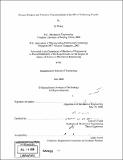Process window and variation characterization of the micro embossing process
Author(s)
Wang, Qi, S.M. Massachusetts Institute of Technology
DownloadFull printable version (22.53Mb)
Other Contributors
Massachusetts Institute of Technology. Dept. of Mechanical Engineering.
Advisor
David E. Hardt.
Terms of use
Metadata
Show full item recordAbstract
The micro embossing process on polymethylmethacrylate (PMMA) is demonstrated experimentally to be a useful process to produce micro fluidic and optical devices. Because this process is a one step thermoplastic deformation process, it is possible to reach high production rates and low cost in manufacturing compared to the standard clean room processes. Currently, the research about this process is still on the feasibility level, with not a quantitative work to optimize the process parameters and assure product quality. In this thesis, an experimental study on process window and variation of Micro Embossing is presented. This study includes the design and manufacturing of an embossing die, the development of an embossing product quality assessment protocol, the process window characterization and the process variation identification. The research results based on the experimental set up in this thesis show that we should apply constant 800N embossing force at an embossing velocity of 1000N/min in order to obtain well formed parts to maintain low process cycle time. (cont.) An embossing temperature of 120°C and de-embossing temperature of 55°C are shown to be the optimal embossing condition to yield good replication and repeatability. These embossing parameters operating window can change with the variation of working piece material, die material and die design.
Description
Thesis (S.M.)--Massachusetts Institute of Technology, Dept. of Mechanical Engineering, 2006. "June 2006." Includes bibliographical references.
Date issued
2006Department
Massachusetts Institute of Technology. Department of Mechanical EngineeringPublisher
Massachusetts Institute of Technology
Keywords
Mechanical Engineering.